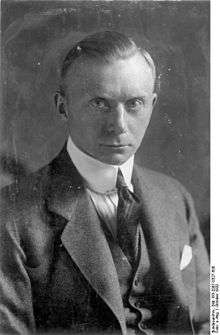Werner von Rheinbaben
Werner Karl Ferdinand Freiherr von Rheinbaben (19 November 1878 – 14 January 1975) was a German diplomat and author.[1]

Rheinbaben was born in Schmiedeberg, Silesia. He was a naval attaché to Rome during 1911–1913.[2] He later wrote of the 1914 July Crisis that it was Wilhelm von Stumm who downplayed the possibility of British intervention and strongly advised the Chancellor Theobald von Bethmann-Hollweg to act quickly.[3] After the First World War, Stumm told Rheinbaben: "I erred in 1914 and advised Bethmann falsely".[3]
Rheinbaben was a member of the German delegation to the League of Nations.[4]
During the 1920s and early 1930s Rheinbaben was a politician belonging to the German People's Party.[1] He was a close political associate of Gustav Stresemann[5] and wrote a sympathetic biography of him in 1928.[6] In 1968 he argued against the views of those post-1945 German historians who claimed that Germany had sought world domination, writing: "Poor Germany! You honestly did not reach for 'world hegemony'!"[7]
Notes
- 'Rheinbaben, Werner Karl Ferdinand Freiherr (Freiherrntitel 1951 legitimiert)', Deutsche Biographie, retrieved 22 July 2018.
- Ulrich Trumpener, 'The Service Attachés and Military Plenipotentiaries of Imperial Germany, 1871-1918', The International History Review Vol. 9, No. 4 (Nov., 1987), p. 625.
- Konrad H. Jarausch, 'The Illusion of Limited War: Chancellor Bethmann Hollweg's Calculated Risk, July 1914', Central European History, Vol. 2, No. 1 (Mar., 1969), p. 74, n. 90.
- Jon Jacobson and John T. Walker, 'The Impulse for a Franco-German Entente: The Origins of the Thoiry Conference, 1926', Journal of Contemporary History, Vol. 10, No. 1 (Jan., 1975), p. 161.
- Manfred J. Enssle, 'Stresemann's Diplomacy Fifty Years after Locarno: Some Recent Perspectives', The Historical Journal, Vol. 20, No. 4 (Dec., 1977), p. 942.
- William L. Langer, 'Some Recent Books on International Relations', Foreign Affairs Vol. 7, No. 1 (Oct., 1928), p. 161.
- Konrad H. Jarausch, 'Review: World Power or Tragic Fate? The Kriegsschuldfrage as Historical Neurosis', Central European History Vol. 5, No. 1 (Mar., 1972), p. 74.